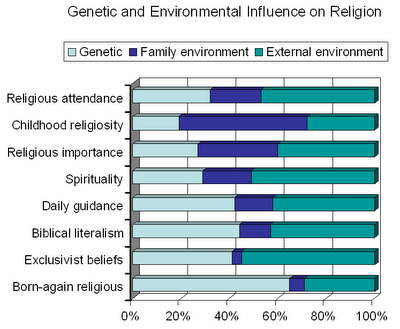 The question of nature versus nurture crops up a lot in discussions of religion. Here’s a study that came out at the end of last year that took a look at the problem.
The question of nature versus nurture crops up a lot in discussions of religion. Here’s a study that came out at the end of last year that took a look at the problem.
It’s a fairly standard twin study. They took a sample of around 600 identical and non-identical twins from the National Survey of Midlife Development in the United States (MIDUS), and looked at a number of religious characteristics.
Basically, their analysis allows them to tease out the variations that are shared by identical twins but not by non-identical ones (genetic factors), by non-identical twins (family factors or shared environment), and that differed even among non-identical twins. This last factor was put down to the effects of external environment (i.e. things that happen in you life that aren’t shared by your twin).
I’ve put the results in the graph. First off, look at childhood religiosity. The biggest factor is your family, and not your genetics. It’s not until adulthood that the effects of genetics really start to shine through. No surprises there!
The ‘salience’, or importance of religion in your life is about one-quarter defined by genetics, as is your spirituality. The most important factor here, however, is the external environment. You get similar results for religious attendance.
When you get to more personal beliefs, the patterns start to shift. There are three factors that are about 40% driven by genetics, with your family upbringing having hardly any effect. These factors are: how often you turn to religion for guidance, whether or not you take the bible literally, and whether people should stick to one faith, or experiment with others (exclusivist beliefs).
As discussed earlier, Jonathan Haidt (psychologist at the University of Virginia) has investigated conservative psychology and found it to be linked to the need for order and the fear of uncertainty. To me, these three religious attitudes are similar to conservative attitudes. I wouldn’t be surprised if these psychological factors trigger both conservatism and religiosity.
But the big finding in this study is the born-again religious. These are the people who answered ‘yes’ to the question: “Have you been ‘born-again,’ that is, had a turning point in your life when you committed yourself to Jesus Christ?” A whopping 65% of this kind of religiosity is genetically driven!
This is particularly amusing given that most of what passes for debate on this topic seems to be between atheists and fundamentalists. If the debate often seems futile and sterile then these data might suggest why. Religious fundamentalists are born, not bred. It’s not a matter of evidence or rational argument. They just can’t help it!
![]()
MATT BRADSHAW, CHRISTOPHER G ELLISON (2008). Do Genetic Factors Influence Religious Life? Findings from a Behavior Genetic Analysis of Twin Siblings Journal for the Scientific Study of Religion, 47 (4), 529-544 DOI: 10.1111/j.1468-5906.2008.00425.x













